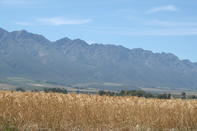Small Town Agriculture
It is easy to see why farming in Porterville is the primary profession for many inhabitants of the friendly town. The vast landscape with its fertile plains makes small town agriculture a natural conclusion. Among the many fruit farms and vineyards that populate the area, wheat production stands above the rest in terms of its sheer volume.

The importance of wheat (Triticum aestivum) production cannot be downplayed in South Africa, where the daily diet of many individuals is comprised of bread, pasta, crackers and biscuits.
Wheat is the main ingredient of flour, which is the foundational ingredient in many delicious household meals fit for a multitude of occasions such as the ones mentioned above.
A Legacy of Wheat

Wheat is different in various countries. The quality is distinct and it comes in different formations. South Africa got its first taste of wheat in 1652, when it was planted for the first time by Jan van Riebeeck, a Dutch colonial administrator sent to the Cape of Good Hope to build a refreshment station for ships travelling to East India. In 1684, wheat was officially a fixed part of the Cape.
Porterville Roller Mill

Today, Porterville continues this legacy as one of the many wheat-producing small towns of the Western Cape Province.
 Porterville is a quaint town with expansive green fields located along the slopes of the Olifants River Mountain at the base of Voorberg. Th...
Porterville is a quaint town with expansive green fields located along the slopes of the Olifants River Mountain at the base of Voorberg. Th... The West Coast is an easy drive from Cape Town and the Winelands, and all you need do is head onto the N7. Villages such as Paternoster, Lan...
The West Coast is an easy drive from Cape Town and the Winelands, and all you need do is head onto the N7. Villages such as Paternoster, Lan...